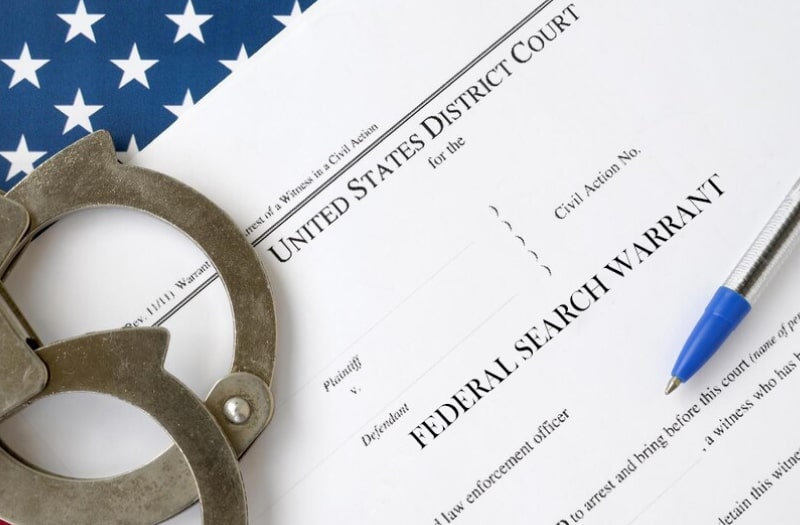We all hold quite an interest in the workings of the criminal law system in the United States. One such important part of it is a federal search warrant.
A search warrant can make or break a case. Without it, the powers of the police and law enforcement have considerable limitations. Have you ever watched a show where the diligent cop tries to get hold of a search warrant? Well, In this article, we will discuss why a search warrant is so important.
Additionally, we will touch upon topics like the following.
a. What are the federal search warrant requirements?
b. How long to execute us federal search warrant after signing by judge?
c. How many motions in a federal case can a defense attorney have to supress a search warrant?
d. And much more.
So, let us begin without any dilly-dallying!
What Is A Federal Search Warrant?

Whenever the tag “federal” comes along with a subject, we know it means serious business. We’re talking about FBI and federal agents. However, there is no need for alarm at the thought of a federal search warrant.
Let us break it down for you. To do that, we will first discuss what is a search warrant.
What Is A Search Warrant?

A search warrant is when a judge or a magistrate signs a warrant. The warrant is an official document that gives an officer of the law enforcement forces to do the following.
a. The officer can carry out a search into a person.
b. They may even search a specific place that has connections to a case.
c. Properties eligible for a search warrant may also include a vehicle or an automobile.
d. The officer carries out the search to gather evidence for a criminal case.
Why Is A Search Warrant That Big A Deal?

Well, a federal search warrant or a general one is an absolute big deal. It stands at the precipice of the constitutional rights of a citizen and criminal justice.
The law of the US guarantees that a warrant is a necessary prerequisite to conduct a search. This means that the law recognizes your need for privacy. A law enforcement official cannot just barge into your home to conduct a search.
Do you know what happens when a case goes to trial? The judge goes through every little detail of the case.
It makes sure that you are not a victim of a ruthless governmental trespass. A search warrant is basically a statement on how intrusion is never justified.
A Federal Search Warrant
This type of search warrant falls under the jurisdiction of a federal court. According to U.S. law, it is a legal document that has the signature of a federal judge or magistrate.
This document gives the law enforcement the right to search a place. Additionally, the officers can also seize items of importance or specific value to the case at hand.
Remember, the warrant is only valid within the jurisdictions of federal courts. Like a normal search warrant, the federal type also gives law enforcement agencies the opportunity to get evidence. However, such warrants only come into play when there is a related to a federal crime.
Do FBI Officials Use Federal Search Warrant?
Yes, they do. Additionally, all law enforcement agencies that operate at the federal level use them. Here’s a list of the agencies that use federal arrest warrant search.
a. Federal Bureau of Investigation (FBI).
b. The Drug Enforcement Administration (DEA).
c. All other federal bodies that investigate crime.
Therefore, these are the warrants that help in the investigation, evidence gathering, and prosecution of federal crimes. Federal crimes are the ones that violate federal laws. Since federal laws apply across state lines, these warrants are valid across the states, too.
What Crime Investigations Require Federal Search Warrant?

These are the kinds of crimes that require a federal warrant.
Drug Trafficking
Crimes like trafficking, distribution, or manufacturing of drugs.
White-Collar Crimes
This may include fraud, embezzlement, money laundering, etc.
Terrorism
This may include planning, financing, and carrying out actions of terrorism.
More crimes that may require a federal warrant include the following.
- Organized crimes.
- Hacking.
- Identity theft.
- Espionage.
- Treason, etc.
What Are The Requisites Of A Federal Search Warrant?
That’s right. A federal official cannot get a magistrate to sign a search warrant whenever they please. There are certain requirements for that.
“The right of the people to be secure in their persons, houses, papers, and effects, against unreasonable searches and seizures, shall not be violated, and no warrant shall issue, but upon probable cause, supported by Oath or affirmation, and particularly describing the place to be searched, and the persons or things to be seized.”
The 4th Amendment of the Constitution prohibits unlawful searches by the government or seizures. They must qualify for the following conditions.
Requisites.
The officials seeking the warrant should prove that there is enough reason for it. It is their duty to show the federal judge that there is reason to believe a crime took place there.
Thus, there should be:
a. Reasonable belief.
b. Belief from facts and circumstances.
c. Additional evidence of a crime from the place of search.
d. Oath or Affirmation by the law enforcement official through an affidavit.
e. An impartial magistrate who has no ties to the investigation.
f. Mention of exact time and place to carry out the warrant.
g. Law enforcement officers will have to announce their entry to the property. They will also have to say why they are present.
h. After the warrant undergoes execution, they have to submit a list of the seized items to the court.
To Conclude
Now that we have reached the end of our article, let’s do a quick recap. A federal search warrant against you does not prove your guilt. It is merely a document that allows law enforcement to carry out their search for evidence.
So, what to do first if federal agents come to your home with a search warrant? Cooperate. The warrant can give them the right to search your residence, car, business, electronic devices, etc.
If you are nervous, go and talk to your lawyer. If it’s urgent, visit a defense lawyer, a toxic tort lawyer, or any lawyer nearby. But, remember, neither the DOJ nor the F.B.I. an carry out a case against you unilaterally. A federal judge will have to go through the request. Your rights are safe under the Fourth Amendment to the Constitution of the USA.
Read Also:






